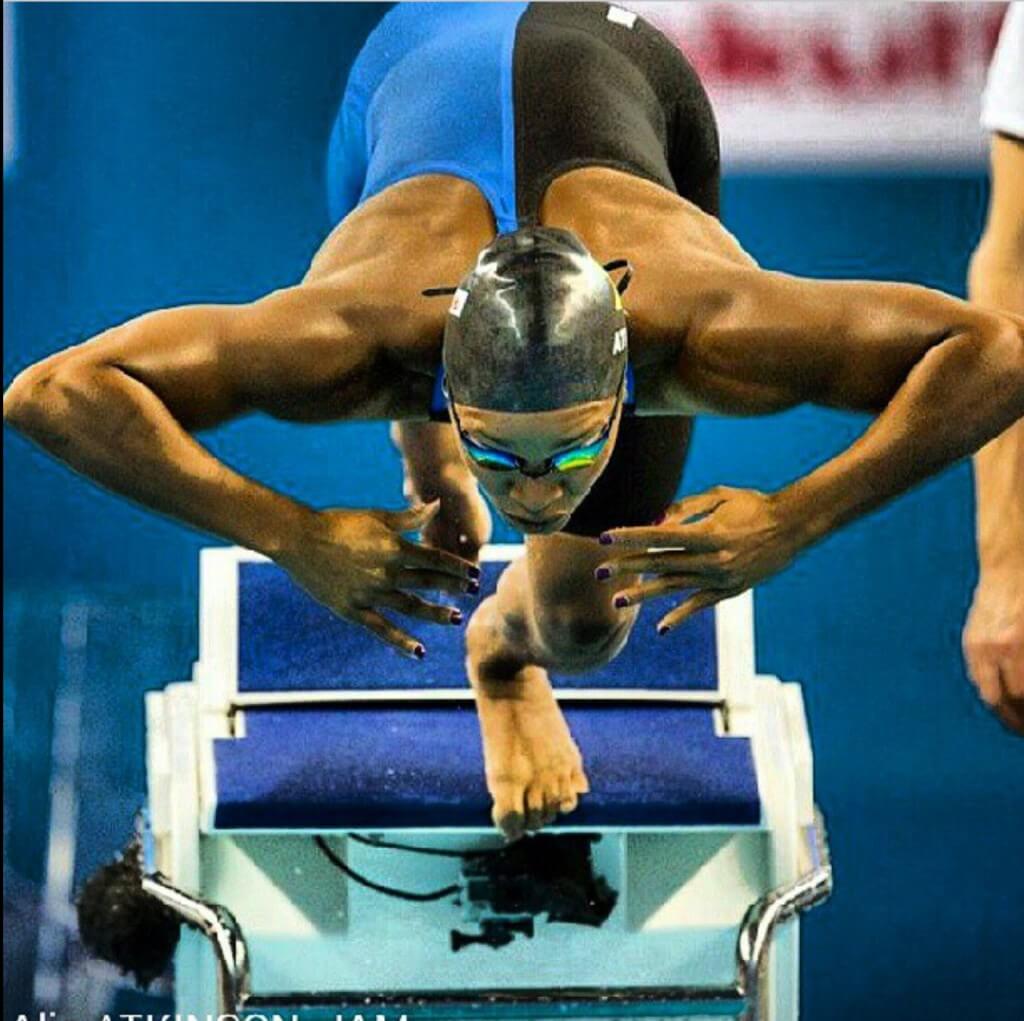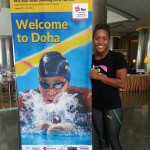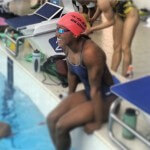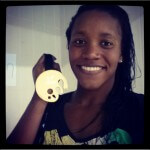The Real Alia Atkinson

By Seren Jones, Swimming World College Intern
By now, many of us know Alia Atkinson as the first black woman and Jamaican to earn a swimming world title. On Dec. 6, the Texas A&M alumna tied Lithuania’s Ruta Meilutyte’s World Record in the 100 breaststroke. The race – which took place at the FINA Short Course World Championships in Doha, Qatar – recorded Atkinson clocking a tremendous 1.02.36.
In doing so, the Jamaican promoted the sport in her homeland, across the Caribbean, and in other minority countries. In a sport that is predominantly white, Atkinson has become the new face of swimming for Jamaicans, African-Americans, and other ethnic minorities alike.
But beneath the stardom and success of her swimming career is the real Alia.
Alia Shanee Atkinson was born on Dec. 11, 1988 in St. Andrew, Jamaica. Although the island is globally renowned for breeding some of the world’s fastest men and women on land, Atkinson’s parents decided to take a different approach on sports.
“Considering where I come from a lot of Jamaicans don’t know how to swim, so my parents thought it was necessary to have all their children know how to swim,” she explained. “We [Atkinson and her two siblings] grew up around the water. We all started swimming [and] we all just stuck with it.”
By the time high school came around, Atkinson migrated to the sunshine state of Florida to continue her swimming career, attending Charles W. Flanagan in Pembroke Pines. Despite the initial adaptations the athlete made to her new American life – like getting used to the school system – Atkinson became a Flanagan Falcon and later joined the Comets Swim Team.
It was during her time on the teams that Atkinson partook in her first Olympic Games, which were held in Athens, Greece, in 2004. The then 15-year-old underwent a unique experience that the rest of her classmates and teammates may not ever know.
“It was one of those experiences where the first time you go somewhere and everything is just fantastic! Everything just looked bigger and better and brighter,” she reminisced. “I was walking around, and I saw the Williams sisters [Venus and Serena] and all these big people and I was just a 15-year-old wondering, ‘What am I doing here?’ I definitely just went for the experience.”
Atkinson’s experience in Athens only spurred her to work harder during the next four years, thus by 2008 she was a matured and motivated student-athlete, ready to make her mark on the swimming landscape.
“2008 was different because I was 19, a lot more mature, and I was expecting a lot more because it was my second Olympics: I was hoping to reach the semifinals,” Atkinson said.
The four years that Atkinson had gained in age made her second Olympic experience much more real than her first.
“Because I was older, there was a whole different type of city life that I got to experience, so I got to experience the Chinese culture, which made the Olympic experience a lot better,” Atkinson said.
However, it was in London 2012 that Atkinson really made a splash in the pool where she placed fourth in the 100 breaststroke. But it didn’t come easy. Atkinson was required to race in a swim-off for a place in the final against Canada’s Tera van Beilen. After touching the wall first in a best time of 1:06.79 and setting a new Jamaican record, Atkinson secured her spot in the final occupying lane eight.
“2012 was exceptional,” she said. “I was 23 and that one [the meet] was for sure the deal-breaker: it was I make finals or I retire. I wanted to see if I’d progressed over the last four years.”
Atkinson successfully proved to herself, her nation, and the world that she had grown as a swimmer as she had the race of her life, clocking a 1:06.93 less than half a second from the bronze medal position.
Despite her success in the breaststroke, Atkinson admitted that she hadn’t always had an immediate connection with the stroke.
“As I was growing up I was more of a freestyler and flyer but as I got older, the flexibility came in and for some reason breaststroke just clicked,” Atkinson said.
In her senior year at Texas A&M, Atkinson became NCAA Champion in the 200-yard breaststroke in a time of 2:07.38, contributing to the team’s top 10 finish.
Atkinson has certainly learned a lot throughout her career. With fame and success comes the inevitable attention from the media. Aside from inflicting pressure on herself, the swimmer confessed to feeling the most pressure at the 2013 FINA World Championships in Barcelona.
“It was one year after the Olympics and I had done so well,” Atkinson said. “I thought more people were looking at me: sponsors, the Jamaican population – who were trying to promote swimming – the U.S population, my coaches; it just seemed like everyone was looking at me.”
The pressure didn’t go down well with the Jamaican idol as she touched twice in ninth place missing out on two finals. But as the athlete she is, Atkinson took the positive from the negative and left Barcelona with an important lesson learned: don’t look at the media.
Having already been to three Olympic Games, Atkinson explained that her stubbornness contributes to her motivation in the pool.
“I always think I can do more. Going into a race, I accomplish what I want to accomplish but I’m already looking forward to the next one,” Atkinson said. “My sights are already on the Grand Prixs next year and Kazan in Russia for the World Championships. So I’m always looking ahead and looking forward to what i have to do.”
Three Olympic Games means 12 years of world-class swimming. At 26, Atkinson already has more Olympic experience than most Olympic athletes. Such a successful occupation demands copious amounts of time, hard work and patience.
At 16, Atkinson was all too familiar with the sacrificing of social events such as prom, parties, and “trivial stuff” – that at the time seemed like a matter of life or death. The teenager found herself asking, “Do I really want to do this?”
It was when Atkinson was at the pool one day and challenged to a race by an unexpected competitor that she discovered the answer.
“This little girl, I think she was about six, asked me who I was,” Atkinson said. “So I introduced myself, and she said ‘I want to race you!’ So we raced, and she put her entire effort into that race. It was so inspiring! After that, it kind of brought up the little girl I was when I was in Jamaica, and it made me decide that I want to swim for that little girl inside me who has the hopes and dreams and to make them come true.”
Since that fateful experience, Atkinson has grown to learn what swimming has given to her. Besides the unbearably early mornings and constant sore muscles, the sport has provided her with reassurance, guidance, and a sense of tranquility.
“It’s a gateway: anything that’s happening in your life, any emotions or stresses, it’s a way out for that one or two hours that you’re in the water and you’re in that little peace zone. That’s you’re safe, that’s your home, it’s just you and the water.”
Swimming also gave Atkinson a sense of identity, something she is very grateful for.
“It helps me portray who I am. Growing up you have all of these different emotions and pressures. Swimming helped define who I am; through all the ups and downs; what you can fight against and what you can’t; where your weaknesses and strengths are. Swimming helped me explore myself and who I am; who Alia really is.”
Atkinson’s endless years of hard work and knockbacks all paid off just under two weeks ago when she tied the 100 breaststroke world record. The one word she used to describe her historical experience was “until.”
“One of the things my mother always said was, ‘How far are you going to swim? How much are you going to give yourself and how far are you going go? And you’re going to do it ‘until.’ So the ‘until’ is until whatever your goal is. Until you succeed. Until you get the gold medal. Until you break the world record. It’s always until whatever you want.”
Many would consider being the first black woman and Jamaican to earn a swimming world title as something to brag about. But not Atkinson.
When asked on how she feels now that she’s made such history she humbly answered, “it was pretty good.”
Atkinson revealed that due to previous negative experiences that she’s had with pressure, it wasn’t something she was pushing for.
“I wasn’t going for the world record or the first black female or Jamaican athlete. I was going to win.”
However, with the win came the record, and with the record came the reality of what Atkinson had achieved.
“It was overwhelming because I didn’t realise what a big step it was – not just for me, but for all the nations that have [ethnic] minorities and the stereotype that black people can’t swim.”
Atkinson’s work doesn’t end in the pool. The athlete – who works at the International Swimming Hall of Fame (ISHOF) – promotes minority swimming by increasing the sport’s popularity among ethnic minorities such as Chinese, Blacks and Hispanics.
According to Atkinson, the aim is to promote water safety for the minority groups and encourage them to come out and enjoy swimming as a sport and a life lesson.
“We’re trying to develop a book, which is in six different languages, so we can go across the Caribbean, around the U.S., and some nations in Africa.”
Alia Shanee Atkinson is 26-years-old. She is a three-time Olympian, two-time world silver medalist, NCAA Champion, and Short Course World Champion and World Record Holder. She’s the first black female and Jamaican to ever receive a swimming world title – and she’s not done yet.
With Rio 2016 inching nearer each day, there’s no reason as to why Atkinson won’t pick up a medal not only for herself, but for her nation and the minorities in the swimming world. The road to Rio won’t be easy, but then nothing worth having ever is.
“If there is a dream or a goal that you want you have to go for it 100%,” she emphasized. “Give all you have for the goals that you have.”
Alia Atkinson’s Personal Photo Gallery
Seren Jones is a junior butterfly/backstroker from Cardiff, Wales, United Kingdom. The Metropolitan Conference individual champion grew up swimming for The City of Cardiff Swimming Club, and qualified for the Great Britain Olympic Trials in 2012.









Hopefully the win /world-record at Doha will push Atkinson to bigger and better things next summer at Kazan, like the top step of the podium, but only so long as its not occupied by one of Uncle Sam’s swimmers!